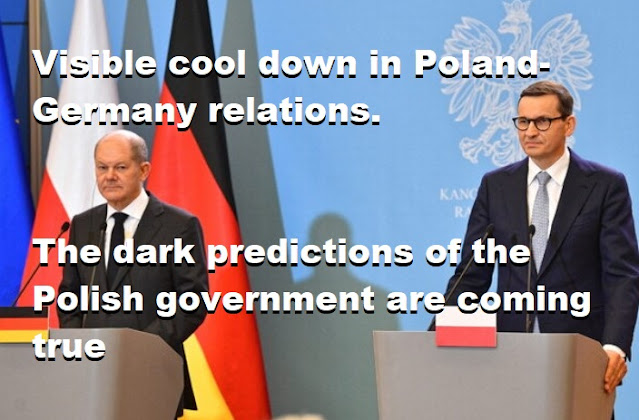Finally, even the German daily "Die Welt," Polish media talk about it for weeks now, points to the Polish government's great disappointment with Germany's attitude in the Ukrainian-Russian crisis. It may lead to a qualitative change in Warsaw's relations with Berlin.
An online edition of Die Welt featured an article about the Polish disappointment with the German government in the face of a possible Russian invasion of Ukraine. Journalists note that Warsaw's many years of appeals for a more resolute attitude towards Russia and blocking the construction of Nord Stream 2 remained unanswered, and Germany turned out to be an uncertain ally.
"It is as if these days the dark predictions of the Polish government were coming true. For years, it has been protesting the construction of the Russian-German Nord Stream 2 gas pipeline, warning that Europe will fall into energy dependence on Russia. The fact that Moscow has now gathered over 100,000 soldiers at the border with Ukraine has for many days been the main topic in neighboring Poland, which has long been considered the loudest critic of Russia's aggressive policy in the EU and feels threatened by Russia," - writes Philipp Fritz the Die Welt correspondent.
The journalist writes that Poland "is deeply confused by the signals that German politicians have been sending for many days" and lists the baffling words and decisions of German representatives of public life in recent days.
"The sympathy of the former naval commander Kay-Achim Schoenbach to Vladimir Putin, the refusal to provide Ukraine with defensive weapons and the increasingly softening statements of leading social democrats such as Kevin Kuehnert or Rolf Muetzenich, but also Bavarian prime minister Markus Soeder, led to such a loss of confidence in Warsaw in German policy, which has not been observed in recent years - despite all the false tones in Polish-German relations,” argues Fritz.
The voices of doubt about German policy come from the ruling camp and the opposition.
"It seems that the new government led by Chancellor Olaf Scholz managed to make the strongly quarrelsome Polish parties agree on something: that Germany is on the wrong side with its policy towards Russia and Ukraine," reads the article.
Fritz concludes that this loss of trust may burden Polish-German relations in the long run.
"Chancellor Scholz, as a Social Democrat, it is not easy when it comes to Poland. Polish politicians look at the SPD with suspicion after Gerhard Schroeder's involvement with Russian energy companies. Many expected Scholz to prove that the new German government was firmly anchored to the Western Alliance. So far, Poland has not received it."
- Based on the article in DoRzeczy(.)pl

